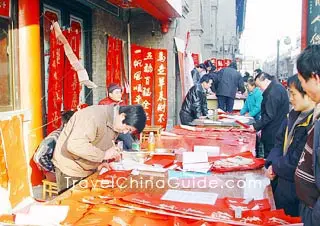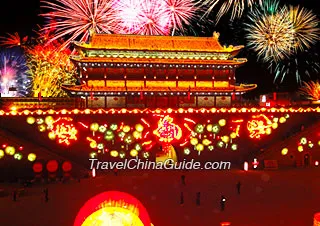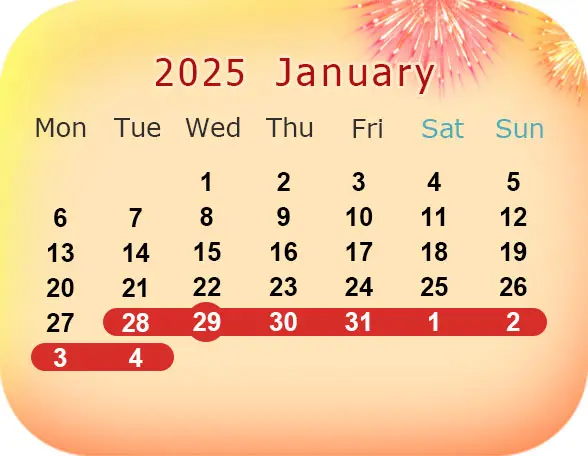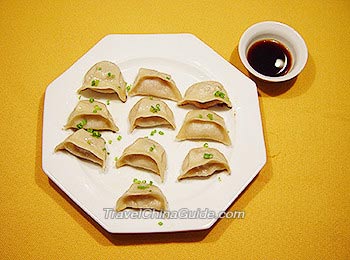~葉子~的博客
開心每一天

最早的春節:相傳中國原始社會時就有“臘祭”之說不得,夏朝建立後,此俗流傳下來。《爾雅》一書說春節: “夏曰歲,商曰祀,周曰年” 。
最早的除夕:中國農曆年的最後一天晚上稱為 “除夕”。 “除夕”源於先秦時期的“逐除”。根據《呂氏春秋》中記載:古人在新年的前一天,擊鼓驅逐“疫病之鬼”,這就是“除夕”的由來。而最早提到“除夕”這一名稱的,是西晉周處的《風土記》。
最早的春聯:據《宋史》記載:宋滅蜀的前一年,(公元964年)除夕,後蜀主孟槌寫下“新年納餘慶,嘉節號長春”,這是被人們公認的第一副春聯。
最早的年畫:年畫的前身叫門畫,最早的年畫形式是門神,畫的是神話傳說中神茶、鬱壘,也有的在門上畫虎或古代勇士像,到了宋代演變為木版年畫。
最早的賀年片:早在宋代就已出現了贈送賀年片的習俗。據南宋人張世南《遊宦紀聞》裏記載,其家藏有北宋元祐年間敬賀正旦的墨跡。“正旦”就是正月初一,“敬賀正旦”就是現在賀年片上印的“恭賀新年"的意思。
最早的爆竹:春節爆竹之俗始於漢代,當時沒有火藥紙張,所謂爆竹,是用火燒竹子發出的啪啪聲。
最早的壓歲錢:據古籍《開元天寶遺事》記載,壓歲錢最早出現在唐玄宗天寶年間,嬪妃們在春節三五結伴做擲錢遊戲,宮廷錢庫就散些錢給她們。此風在當時宮廷內是很盛行的。
|
|
 |
| Writing Festival Couplets |
It comes on the first day of Chinese lunar calendar and lasts for almost half of a month. But in folk custom, this traditional holiday lasts from the 23rd day of the twelfth month to the 15th day of the first month (Lantern Festival) in the lunar calendar. Among these days, the New Year’s Eve and the first day of the New Year is the peak time. The exact days are different in every year according to the lunar calendar. Schedule of Spring Festival in recent years is offered in the following table.
| Year | Date | Holiday | Chinese Zodiac |
| 2012 | January 23 | January 22 - 28 | Dragon |
| 2013 | February 10 | February 9 - 15 | Snake |
| 2014 | January 31 | January 31 - February 6 | Horse |
| 2015 | February 19 | February 19 - 25 | Sheep |
| 2016 | February 8 | February 8 - 14 | Monkey |
| 2017 | January 28 | January 28 - February 3 | Rooster |
 |
| Couplets and Decorations |
It is said that the custom of Spring Festival started in when people offered sacrifice to ancestors in the last month of Chinese lunar calendar. At that time, people prepared the sacrifice by doing thorough cleaning, having bathes and so on. Later, people began to worship different deities as well on that day. It is the time that almost all the farm works were done and people have free time. The sacrificing time changed according to the farming schedule and was not fixed until the Han Dynasty (202BC-220AD). The customs of worshipping deities and ancestors remains even though the ceremonies are not as grand as before. It is also the time that spring is coming, so people held all kinds of ceremonies to welcome it.
There are many legends about Spring Festival in Chinese culture. In folk culture, it is also called “guonian” (meaning “passing a year”). It is said that the “nian” (year) was a strong monster which was fierce and cruel and ate one kind of animal including human being a day. Human beings were scared about it and had to hide on the evening when the “nian” came out. Later, people found that “nian” was very scared about the red color and fireworks. So after that, people use red color and fireworks or firecrackers to drive away “nian”. As a result, the custom of using red color and setting off fireworks remains.
Preparing the New Year starts 7 days before the New Year’s Eve. According to Chinese lunar calendar, people start to clean the house on Dec. 24, butcher on Dec. 26th and so on. People have certain things to do on each day. These activities will end Jan. 15th of the lunar calendar.
 |
| Paper Cut of Character 'Fu' Meaning Happiness and 'Feng' Meaning Harvest |
The Spring Festival is a start for a new year, so it is regarded as the omen of a year. People have many taboos during this period. Many bad words related to “death”, “broken”, “killing”, “ghost” and “illness” or “sickness” are forbidden during conversations. In some places, there are more specific details. They consider it unlucky if the barrel of rice is empty, because they think they will have nothing to eat in the next year. Taking medicine is forbidden on this day, otherwise, people will have sick for the whole year and take medicine constantly.
 |
| Dumplings, Traditional Food of Spring Festival |
In China, different places have their own traditions and activities to celebrate the Spring Festival. Beijing, Guangzhou, Xian and Pingyao are some good places to go if one intends to come during the time period. If one does not want to travel so long, but still want to enjoy the atmosphere of Chinese New Year, the local Chinatown is the best place.
New Year Greetings
- Frequently Used Blessing Words
-
Happy New Year!

-
Happy New Year!

-
Happy New Year!

-
Happy Spring Festival!

-
Happy Spring Festival!

-
Wish you a happy new year!

-
Wish your family a happy Spring Festival!

-
Wish all of you a happy Spring Festival!

-
Happy New Year!

-
May all your wishes come true!

-
May all your wishes be fulfilled!

-
Good luck!

- For Fortune and Career
-
Wish you prosperity!

-
May a river of gold flow into your pocket!

-
May you earn more fortune!

-
Business flourishes!

-
Harmony brings wealth!

-
Money and treasures will be plentiful!

-
Treasures fill the home!

-
May you have promotion every year!

-
May you realize your ambition!

-
Hope everything goes well with your work!

-
Wish you every success in your career!

-
Have a meteoric rise in life!

-
Have a meteoric rise (said of career or social position)!

-
Win success immediately upon arrival!

- For Family and Health
-
Literally meaning ‘Spirit of Dragon and Hose’. Hope you will be full of vigor.

-
May you peaceful all year round!

-
Wish you good health!

-
May you live a happy life with your family!

-
Wish you every success!

-
Hope everything goes well!

-
Best of luck!

-
Wish you a happy family!

-
May you have surpluses and bountiful harvests every year!

- For students
-
Wish you every success in your studies!

-
Make progress in your studies!

-
Succeed in the examinations!










